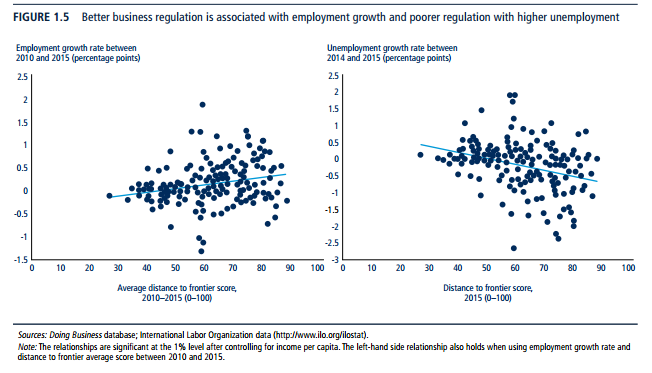The World Bank’s latest Doing Business report is out (check out last year’s). The report “measures regulations affecting 11 areas of the life of a business. Ten of these areas are included in this year’s ranking on the ease of doing business: starting a business, dealing with construction permits, getting electricity, registering property, getting credit, protecting minority investors, paying taxes, trading across borders, enforcing contracts and resolving insolvency. Doing Business also measures labor market regulation, which is not included in this year’s ranking.”
Its main findings:
- Brunei Darussalam, Thailand, Malawi, Kosovo, India, Uzbekistan, Zambia, Nigeria, Djibouti and El Salvador were the most improved economies in 2016/17 in areas tracked by Doing Business. Together, these 10 top improvers implemented 53 regulatory reforms making it easier to do business.
- Economies in all regions are implementing reforms easing the process of doing business, but Europe and Central Asia continues to be the region with the highest share of economies implementing at least one reform—79% of economies in the region have implemented at least one business regulatory reform, followed by South Asia and Sub-Saharan Africa.
- The report features four case studies in the areas of starting a business, dealing with construction permits, registering property and resolving insolvency, as well as an annex on labor market regulation. See all case studies.
The report finds that
one of the mechanisms through which business regulation can impact employment directly is the simplification of business start-up regulations. Across economies there is a significant positive association between employment growth and the distance to frontier score (figure 1.5).While this result shows an association, and cannot be interpreted in a causal fashion, it is reassuring to see that economies with better business regulation, as measured by Doing Business, also tend to be the economies that are creating more job opportunities. When it comes to unemployment, the expected opposite result is evident. Economies with less streamlined business regulation are those with higher levels of unemployment on average. In fact, a one-point improvement in the distance to frontier score is associated with a 0.02 percentage point decline in unemployment growth rate.
…The data support this interpretation as there is a strong association between inequality, poverty and business regulation. In fact, economies with better business regulation have lower levels of poverty on average. Indeed, a 10 percentage point improvement in the distance to frontier is associated with a 2 percentage point reduction in the poverty rate, measured as the percentage of people earning less than $1.90 a day. Fragility is also a factor linked to poverty. However, even fragile economies can improve in areas that ultimately reduce poverty levels (pg. 7-8).
Check out the full report.
